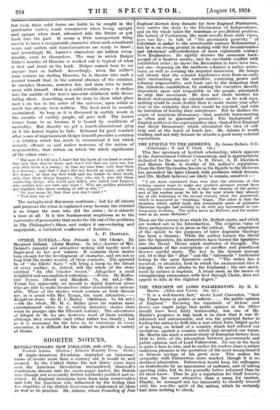" It is a well-known fact," wrote Lord Clarendon, "that the
Times. forms _or guides or reflects-. . the-public opinion of England." Knowing the standards of Delane and Reeve one might judge e.that public opinion in the 'fifties should have been fairly trustworthy, but one of Mr. Martin's purposes in this book is to show that it was ill- informed and unreasonable, and was the principal factor in leading the nation to drift into a war which John Bright spoke of as being on behalf of a country which had refused our mediation, against a country which had accepted our terms. Mr. Martin has made a serious study of European history from 1846 to 1854, of the interaction between governments and public opinion, and of Lord Palmerston. No one in the book is quite a hero to him, and he makes his readers share a rather malicious pleasure in the quotation of the most wrong-headed or fatuous sayings of his great men. This makes his sympathy with Palmerston more marked, though it is no declared admiration. Palmerston would keep his colleagues on tenterhooks by an appearance of rashness, and of taking sporting risks, but he was generally better informed than he let them know. Thus he got a reputation for bluff honesty that was far more attractive than a name for caution. Finally, he managed not too innocently to identify himself with the war-like spirit of the nation., which he certainly had done nothing to check.


































 Previous page
Previous page